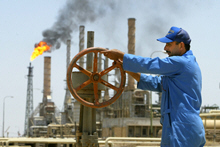
Typical street scene in Santa Ana, El Salvador. (Photo: iStock)
IMF Survey: Jeddah Meeting Calls for Steps to Restore Oil Market Stability
June 23, 2008
- Focus on detrimental impact of current oil prices, volatility on global economy
- IMF urges strong policies to anchor market expectations, reverse sentiment
- Saudi Arabia to boost oil output, help poorest countries cope with high prices
Major oil producing and consuming countries met in Jeddah, Saudi Arabia, June 22 to identify the causes of the recent oil price increases and suggest policies to improve oil market stability.

Oil meeting stressed importance of data on upstream, downstream capacity, expansion plans, proven reserves (photo: Jamal Said/Reuters)
OIL PRICE SURGE
Highlighting the detrimental impact of current oil price levels and volatility on the global economy, the meeting concluded with an urgent call for concerted policy efforts to improve the functioning of the oil market.
Participants agreed that restoring oil market stability requires concerted moves to implement a broad set of policy measures, including increased oil investment, strengthened pass-through of price signals to end-users, and improved oil market data.
The Saudi Arabian government announced at the meeting that the country stood ready to increase oil production beyond the 0.5 million barrels a day (mbd) rise already planned for July for the remainder of the year. Its oil production capacity will reach 12.5 mbd by end-2009, with ready plans for further expansion to 15 mbd if warranted by demand developments. In addition, Saudi Arabia will provide a total of $1.5 billion to help the poorest countries cope with higher oil and food prices.
New policy agenda
The broad-based policy agenda developed at the meeting—held at the invitation of the Saudi Arabian government—includes measures to
• boost oil investment
• improve transparency and regulation of oil financial markets
• enhance oil market data
• strengthen cooperation among international and national oil companies and improve access to technology
• ensure pass-through of price signals to end-users, and
• step up development assistance to poor countries most affected by high prices.
Market expectations
First Deputy Managing Director John Lipsky, representing the IMF at the meeting, welcomed the Saudi Arabian announcement: "There is an urgent need for a strong set of policy actions to anchor oil market expectations and reverse market sentiment," Lipsky said.
He added that the Saudi Arabian production increases and capacity commitments are important signals in this regard. "I hope that other major producing and consuming countries will follow suit with concrete measures. The priority is to adjust policies that have fostered market rigidities and prevented demand and supply from appropriately responding to the signals from rising prices."
There was widespread recognition of the essential role that underlying oil demand and supply fundamentals have played in the recent oil price surge. Slow growth of new capacity and continued strong demand in emerging economies have led to declining spare capacity and tight market conditions.
Financial factors
In contrast, the role of financial commodity investment and financial speculation remained a point of discord at the meeting. In his remarks at the conference, Lipsky said that financial factors played a temporary role in the recent run-up of oil prices, but that it remained difficult so far to establish a lasting impact of financial commodity investment on oil price trends over the past few years.
Lipsky noted that the IMF will be cooperating with the International Energy Agency to study this issue further, as requested recently by the G-8 Finance Ministers meeting in Osaka, Japan.
Besides strengthening the role of price signals in oil markets, improving oil market data was widely recognized as another policy priority. In addition to timely and adequate global data on oil demand, production, and inventories, participants also emphasized the importance of data on upstream and downstream capacity, on expansion plans, and on proven reserves. Only with such data could oil markets assess current and future production trends.
A follow-up conference hosted by the United Kingdom government will assess the progress on the policy agenda before the end of 2008.
Comments on this article should be sent to imfsurvey@imf.org


